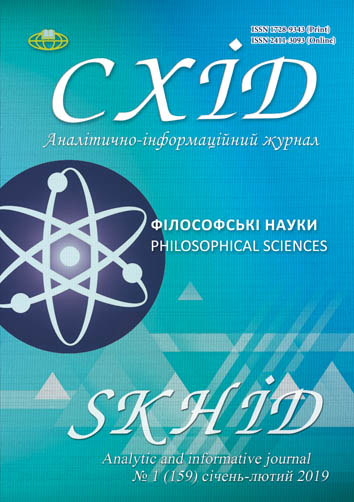Conceptualization of strategies for transformation of social development of global civilization
DOI:
https://doi.org/10.21847/1728-9343.2019.1(159).157627Keywords:
globalization, socio-philosophical analysis, civilization approach, world system, modernization, neoliberalism, global governance, international crises, intranet nationalization, democratization, anti-globalizationAbstract
In today's social philosophy, trends, concepts and models that are devoted to analyzing, researching and forecasting the development of a global society, its institutes, structures and systems are increasingly forming. Thus, on the one hand, globalization leads to economic prosperity, and on the other hand, determines the democratization of social and political life. The fact that globalization stimulates democracy is confirmed by examples where, thanks to modern information technology as producers and the intellectual, scientific, educational and industrial sectors, they have the opportunity to supply their products independently, without intermediaries, to markets, that is, markets are not currently closed by individual countries.
At the same time, note that in the process of heated debates neither supporters nor representatives of globalization have not yet had a constructive vision of globalization, leading a dispute around certain aspects of the problem.
Downloads
References
Azroyants, E. (2002). Globalizacija: katastrofa ili put k razvitiju? Sovremennye tendencii mirovogo razvitija i politicheskie ambicii. «Novyj vek» Publishing, Moscow, 416 p. (In Russian).
Bello, W. (2016). U.S. Foreign Policy? Donald Trump. (How the CIA, bad trade deals, and wanton military intervention caused the social crises that gave us the Donald). Foreign Policy In Focus, January 6, Retrieved from http://fpif.org/ultimate-blowback-u-s-foreign-policy-donald-trump (In English).
Bhagvati, Dzh. (2005). V zatshitu globalizatsii. Trans. from English. Ladomir Publishing, Moscow, 448 p. (In Russian).
Bhagwati, J. (2013). Why Growth Matters: How Economic Growth in India Reduced Poverty and the Lessons for Other Developing Countries. PublicAffairs, New York, 280 p. (In English).
Brzezinski, Zb. (2009). Velikaja shahmatnaja doska. Trans. from English. Mezhdunarodnye otnoshenija, Moscow, 478 p. (In Russian).
Bіletsky, V. S. (2003). Zagrozi globalіzmu. In: Socialnye, ekonomicheskie, politicheskie i psihologicheskie posledstvija globalizacii v sovremennom obtchestve: materiali Vseukr. nauch.-prakt. konf., 03.13-14.2003, Donetsk: 23-27. (In Ukrainian).
Bіlorus, O. (2010). Globalіstyka - nova syntetychna nauka. Vіsnyk Natsіonalnoyi akademіyi nauk Ukrayiny. № 3: 17-26. (In Ukrainian).
Deliagin, M. G. (2016). Mirovoj krizis: Obshaja teorija globalizacii. (6 Ed.), INFRA-M, Moscow, 768 p. (In Russian).
Dreaming with BRICs: The Path to 2050. The Goldman Sachs Group Inc. Retrieved from http://www2.goldmansachs.com/idecs/brics/book/99-dreaming.pdf (In English).
Engdahl, W. (2011). A century of war. Anglo-American oil politics and the New World Order. Dinges & Frick, Wiesbaden: 356 p. (In English).
Mikhaylov, V. A. and Buyanov, V. S. (ed.) (2008). Globalizacija. RAGS Publishing, Moscow, 544 p. (In Russian).
Globalizacija mirovogo khosiaystva i nacionalnyje interesy. (2002). Ekonomicheskij fakultet MGU, TEIS, 631 p. (In Russian).
Hardt, M. & Negri, A. (2006). Multitude: War and Democracy in the Age of Empire. The Penguin Press, New York: 450 р. (In English).
Hardt, M. (2000). Empire. Cambridge, MA: Harvard University Press, 478 p. (In English).
Henwood, D. (2015). Wall Street. How It Works and for Whom. Verso. London and New York: 272 p. (In English).
Krugman, P. (2009). The Conscience of a Liberal. W. W. Norton & Company, New York: 352 р. (In English)
Lenin, V. I. (1969). Imperializm, kak vysshaja stadija kapitalizma. In: Polnoe sobranie sochineniy: v 55 t. (5 ed.). Vol.27. Politizdat, Moscow: 299-426. (In Russian).
Linz, J. (2016). Problems of Democratic Transition and Consolidation. Baltimore (Md.), London: The John Hopkins Univ. Press., 504 р. (In English).
Martin, G. (2001). Zapadnia globalizatsii. ALPINA, Moscow, 335 p. (In Russian).
Naisbitt, J. (2016). Global Paradox. Avon Books, 392 p. (In English).
Skejz, R. (2007). Globalnyi peredel: kak perestroit sebia i svoyu kompaniyu. Vershina, Moscow, 208 p. (In Russian).
Soros, G. (1999). Krizis mirovogo kapitalizma. Trans. from English. Moscow, 262 p. (In Russian).
Soros, G. (2004). O globalizatsii. Trans. from English. EKSMO, Moscow, 220 p. (In Russian).
Stiglitz, J. E. (2013). Globalization and Its Discontents. W. W. Norton & Company, New York: 304 р. (In English).
UNCTAD Handbook Statistics (2017). New York and Geneva: United Nations Organisation, 87 р. (In English).
World Bank (2016). The East Asian Miracle: Economic Growth and Public Policy. Washington: Oxford University Press, 120 p. (In English).
Downloads
Published
How to Cite
Issue
Section
License
Copyright (c) 2019 Viatcheslav Subbotin

This work is licensed under a Creative Commons Attribution-NonCommercial-NoDerivatives 4.0 International License.
1. Authors bear responsibility for the accuracy of facts, quotations, numbers and names used.
2. Manuscripts are not sent back.
3. The publisher does not always agree with the authors' opinion.
4. The authors reserve the right to authorship of the work and pass the first publication right of this work to the journal under the terms of a Creative Commons Attribution-NonCommercial-NoDerivatives 4.0 International License. This license allows others to distribute (copy) the published work for non-commercial purposes, provided there is mandatory attribution to its authors and a link to the first publication in our journal.
5. The authors have the right to conclude separate supplement agreements that relate to non-exclusive work distribution in the form in which it has been published by the journal (for example, to upload the work to the online storage of the journal or publish it as part of a monograph), provided that the reference to the first publication of the work in this journal is included.

